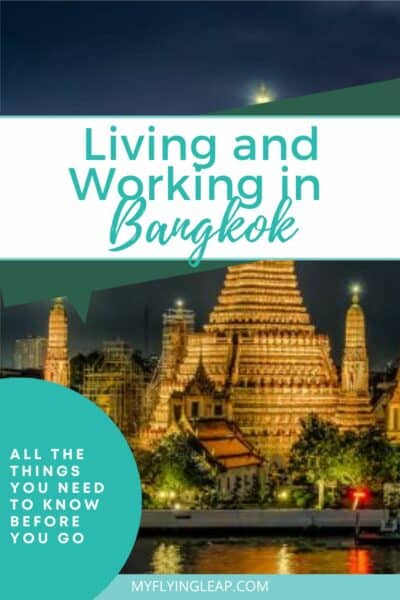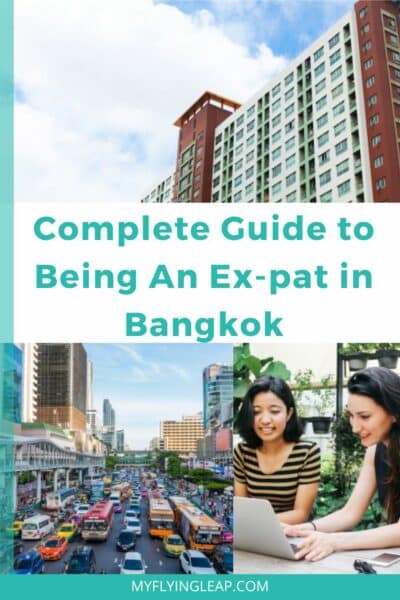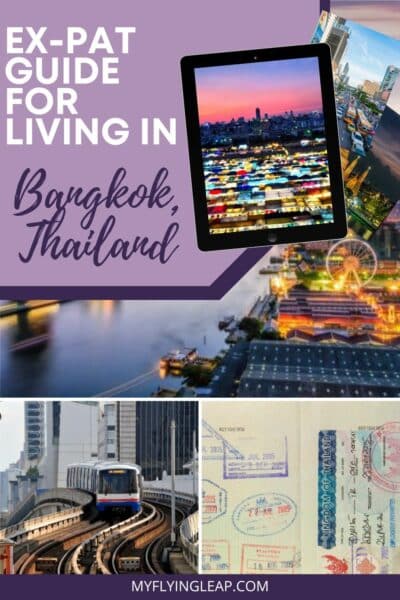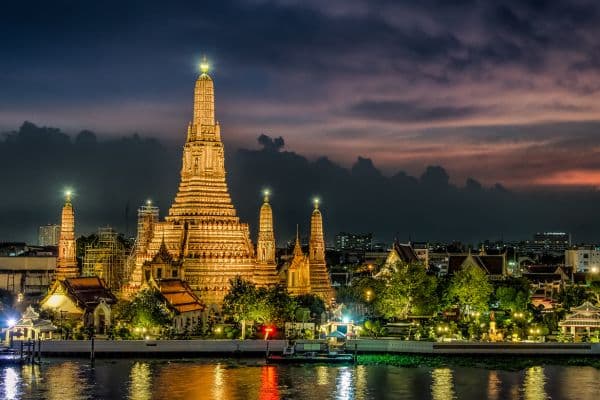Living in Bangkok—Expat Guide
Are you considering living in Bangkok but unsure how to prepare for the big move? This guide has all the details you need to know.
Living in Bangkok as a teacher was one of the best times of my life. I made many friends, saved up a good bit of money, and got to experience one of the best cities in the world.
Many ex-pats in Bangkok work as English teachers. The city also has many digital nomads who work remotely either for jobs from their home countries or as freelancers.
Most ex-pats love their time in Bangkok because the housing, food, and everything is extremely affordable! You’ll find that you don’t have to struggle to make ends meet, and you can sit back and enjoy Thailand’s culture, food, and lifestyle.
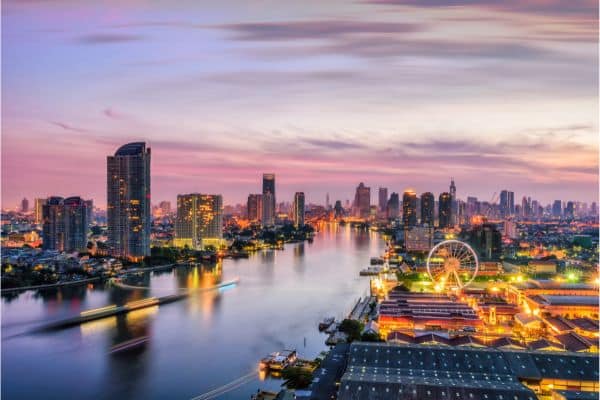
This post may contain affiliate links, which means I’ll receive a commission if you purchase through my links at no extra cost to you. Please read the full disclosure for more information.
Why Consider Living in Bangkok?
If you’re looking for a city full of diverse people, unique cuisine, and plenty of opportunities, Bangkok should be one of the first cities you consider when looking for somewhere to live and work abroad.
Bangkok is also the gateway to other Southeast Asian cities, so you can easily explore other parts of the area, including Cambodia, Vietnam, and Laos.
Even though Bangkok is the capital city of Thailand, it’s much more affordable than other capital cities around the world. Bangkok has everything you could imagine regarding apartments and food, so it’s easy to find something similar to what you’re used to at home.
Is Bangkok Safe?
One of the things I miss most about living in Bangkok is how safe I felt, even when traveling alone. Violent crime is rare, especially against tourists and ex-pats.
The main thing you have to worry about is pickpocketing, so always make sure you keep your bag and personal belongings close to you at all times.
Most Thais are nice and will inform you when you drop money on the ground or accidentally leave something behind in a restaurant or cafe.
Like all large cities, there are some seedy parts of town. Avoid these at night and be very careful walking alone in areas you don’t know.
Most ex-pats tend to live in the same neighborhoods, and these are generally safe to walk around at all hours of the day, even if you’re alone.
Cost of Living in Bangkok
Before living in Bangkok as an ex-pat, knowing the cost of living is important so you can adequately prepare yourself. In general, though, you’ll find the cost of living much more affordable than what you experience at home.
The wages you receive as an expat are also more than enough to pay for an apartment, buy new clothes, eat excellent food, and even save money at the end of the month.
Here is a quick breakdown of the costs you can expect:
- Cost of a studio apartment not in the city center: $300-$500.
- Apartments near Sukhumvit Road (main ex-pat area): $1500 or more depending on if you get a two-bedroom or one-bedroom.
- Thai street food: $1-$3 depending on the dish.
- Dishes in fancy restaurants: $20-$30 depending on the dish.
- Water bill: Around $10 a month.
- Electricity: $50-$150 a month, depending on whether you use air conditioning.
- Transportation: If you use a motorbike or tuk-tuk, it usually only costs a few dollars to get from one place to another, depending on where you’re going. The SkyTrain is also very affordable.
- Clothes: Cost only a few dollars in the local markets, or you can spend the same prices as you do back home if you shop in the malls.
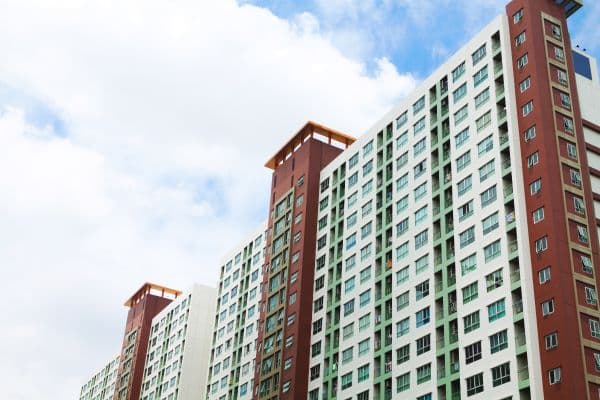
Best Places to Live in Bangkok
With so many neighborhoods in Bangkok, finding a good place to live can be challenging. I recommend joining Facebook pages for ex-pats in Bangkok and housing for ex-pats in Bangkok.
Here, you’ll be able to find places for rent and people looking for roommates if you want to stay in shared accommodation.
Here are the main areas where ex-pats live in Bangkok:
Sukhumvit
Sukhumvit is arguably the best place to live in Bangkok and the most pricey. According to ex-pats, it’s the “city center,” but it’s pretty far outside of it.
Many ex-pats like to live here because it has some of the best nightlife in Bangkok. For those who don’t like nightclubs, there are also tons of quiet restaurants and bars.
While it’s an amazing scene of highrise condos and apartments, I think Sukhumvit is better for young ex-pats and ex-pats who are not bringing their families to Bangkok.
If you’re coming as a family or are not into the party scene, one of the other neighborhoods is probably better for you.
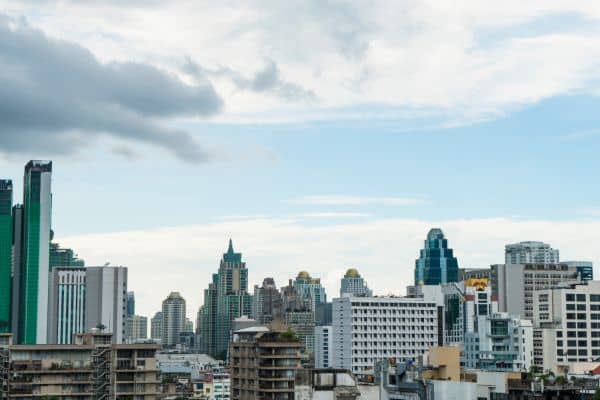
Silom
This is where I lived during my time in Bangkok. Although it’s in the Central Business District and can get a little chaotic sometimes, I loved living here because it’s close to all the main transport hubs. You can get around Bangkok easily and get to other parts of Thailand.
As it’s right in the middle of the city, you’ll find many high-class restaurants, local joints, and street vendors.
Like all places in the city center, prices are higher here, so make sure you find an affordable place based on your income. You’ll find a wide range here and something for most budget points.
Ratchada
Two of my friends lived in Ratchada, and this would have been my second choice if I hadn’t found a great deal on an apartment in Silom. It’s further from the city center, but the rent prices are very low.
There are many co-working spaces here, so it worked great for my two friends staying here for a short time as digital nomads. Few international schools are in the area, so most ex-pats staying here are not teachers.
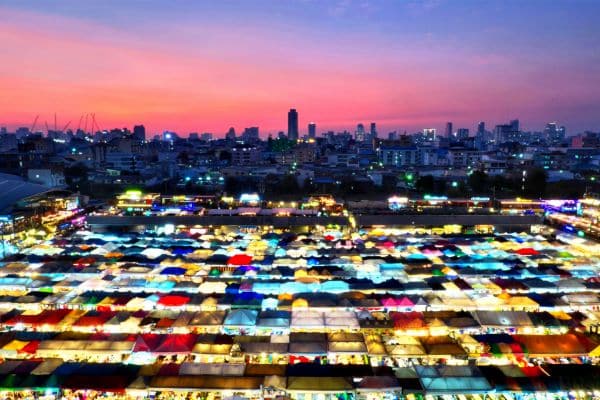
Phrom Phrang
This neighborhood is great because it’s between the city center and the suburbs, so you get the best of both worlds. You are close enough to the city to enjoy everything but can still live a quieter life with plenty of parks and green spaces.
This neighborhood is quickly growing in popularity, so rent prices might go up soon as more people leave the city center for Phrom Phrang.
How to Get Around Bangkok
There are many ways to get around Bangkok. If you’re going a short distance, I recommend hopping on the back of a motorbike or going on a tuk-tuk. Both can be found on almost any street and are very affordable.
Just ask about the price before they start driving, and feel free to negotiate if you feel the price is unfair.
I recommend avoiding buses as you can get stuck in traffic. I also never used private taxis as they are expensive and can get stuck in traffic.
The SkyTrain is also a great choice for getting around. You don’t have to worry about traffic, and it’s fast and affordable.
Bangkok also has a metro (MRT train). It has one route with 18 stations, making it easy to navigate. It also has some of the same stops as the SkyTrain, making it convenient to use both if needed.
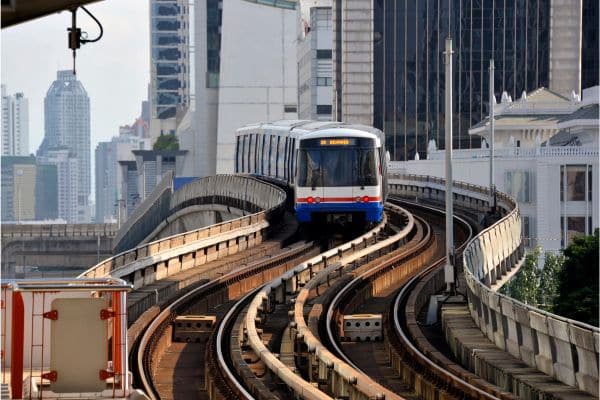
Weather in Bangkok
One of the only things I don’t miss about Bangkok is the weather. It’s very hot and humid all year round, sometimes with temperatures reaching 104°F (40°C) with 100% humidity.
Of course, you don’t notice the weather if you have air conditioning in your workplace and apartment. Most local restaurants and cafes don’t have air-con, but the ex-pat places do, so you can enjoy your coffee and meal without sweating.
However, a big pro about living in Bangkok is that you can always take weekend trips to the beach to enjoy the sun.
Bangkok has a major rainy season. It will usually rain every day, sometimes all day, in September and October. The main dry season is from November to April.
Coworking Spaces in Bangkok
Looking for some of the best coworking spaces in Bangkok?
Here are places where digital nomads work during the day and even the night. Teachers often come here to lesson plan and meet with other teachers.
- Glowfish: While there are several locations, the one in Sathorn is the best. It’s over 4,000 square meters and has private working rooms and group meeting areas.
- The Hive: This is a co-working space that began in Hong Kong and has since moved to many different Asian cities, including Bangkok, in two locations. Most ex-pats prefer the one in Sukhumvit as it’s within walking distance of bars, restaurants, and cafes.
- Common Ground: One of the busiest co-working spaces in Bangkok, you’re bound to make plenty of new friends here.
- Spaces: They have three meeting rooms and more than 300 desks where you can work. There is also a coffee shop inside, and it’s located in Summer Hill Mall, where you can find other things to eat and drink.

Pros and Cons Living in Bangkok
One of the best things to do before making a big decision is to make a pros and cons list! Here is one to help you learn more about expat life in Bangkok.
Pros of Living in Bangkok
- Low cost of living relative to Western cities.
- It’s generally very safe, including for solo females.
- Thai food is amazing.
- You can likely live a much more luxurious lifestyle than you do at home.
- Chance to live in a diverse city and meet people from all over the world.
- Easy access to other Thai cities as well as other destinations throughout Southeast Asia.
Cons of Living in Bangkok
- The temperature is hot and humid all year round.
- The city is very polluted in some areas, and air quality can be poor.
- Many locals don’t speak English.
- Bad traffic in some areas.
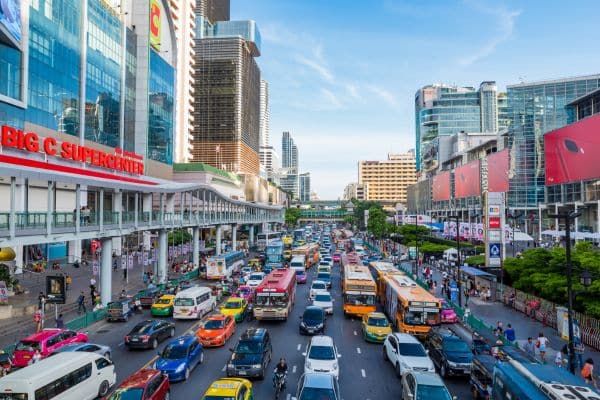
Wi-Fi Speeds in Bangkok
Thailand has many different options for Wi-Fi. If you are getting your own house or apartment, you will probably need to set up the Wi-Fi.
The best company depends on where you’re living, so I recommend asking other ex-pats near you what Wi-Fi they use.
Here are the Wi-Fi companies I found to be the fastest I and most of my friends used.
- True Online: One of the top providers in the country with many different plan options. The plans are affordable, and they have the best customer service of all the Wi-Fi companies in Thailand.
- TOT Fibernet: This is the best company to go with if you also plan to get a cable plan for your television, as they allow bundle package deals. The Wi-Fi speeds are slightly slower than True Online, but they have a very affordable unlimited plan.
- AIS Fiber: I had AIS Fiber in my apartment, but it was included in the rent, so I’m not sure how much their monthly plan costs. The Wi-Fi was always super fast, and I never had any outages while I was living in Bangkok.
Overall, the Wi-Fi speeds in Bangkok are fast, and I never had an issue working, downloading music, or streaming movies and television series.
Most cafes I went to also had fast Wi-Fi, although I did most of my work at home since there was already unlimited Wi-Fi there.
Visas in Bangkok
Visas in Thailand are a little more complicated than other destinations worldwide. They do not have a digital nomad visa like many other countries, but there are other options.
If you have a remote job and do not want to work in a Thai business or institution, your best bet is to apply for the LTR Long-Term Resident visa. However, it’s quite expensive, and you must work for a company listed on the international stock exchange.
Most people who own online businesses or work as freelancers can’t apply for this visa due to this restriction.
Many people doing remote work I met in Bangkok stayed on a tourist visa for three months. Then, they headed to another destination to continue their digital nomad lifestyle.
Getting a work permit is the easiest way to live and work in Thailand is to get a work permit. A Thai business must employ you, and then they will file the work permit for you.
Most ex-pats living in Thailand are English Teachers at international schools. This a popular job because they offer high monthly wages and sometimes they also offer housing and transportation allowances.
If you have a job at a school, you will apply for the Non-Immigrant Visa Category B, specifically for teachers. The school can help you apply for this and give you all the necessary information.
If you’re working for a Thai business that is not a school, there are many different visas, depending on which sector you’re working in and whether your work includes investments. You will need to contact your local embassy for the best information.
The company you are working with should also be aware of the requirements and be able to help you apply for the right visa.
Keep in mind your spouse and dependents will also need visas, and not every kind of permit allows you to bring along a spouse and children.
If you have a family and want to work as an expat in Bangkok, ensure they can come before accepting a job.
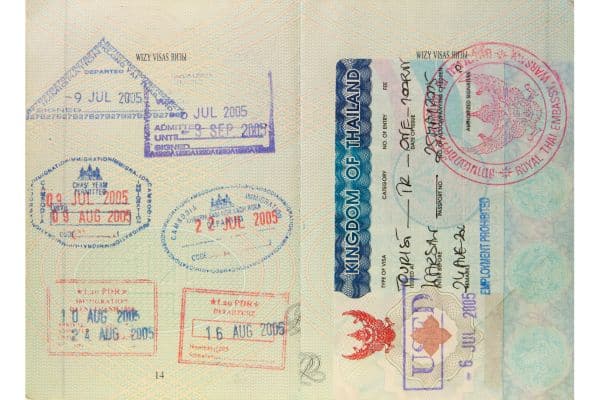
Living in Bangkok—Everything You Need to Know
Ready to start living in Bangkok? I hope this guide showed you everything you need to know so you can easily prepare for your move.
The weeks leading up to your move to Thailand might be nerve-wracking, but I guarantee you won’t regret one second of your time in this amazing city.
Are you planning to live in Bangkok as an ex-pat? Do you have any questions not answered in this guide?
You Might Also Like
- 20 Things to Know Before You Go to Thailand
- Top Things to do on a Chiang Mai Itinerary
- Tok Sen Massage—a Northern Thailand Experience
- Top Temples to Visit in Chiang Rai
- Best Thailand Animal Sanctuary—Elephant Nature Park
- The Best 2-Day Itinerary in Bangkok
- Why You Should Visit Lumphini Park in Bangkok
- Krabi Sunset Cruises—Best Thailand Cruise
- My Thai Paradise—Ban Sainai Resort in Krabi
- The Best Places to Visit in Thailand
- Where to Stay in Bangkok—Best Areas & Accommodation
- 8 Incredible Things to Do in Bangkok
- 8 Unforgettable Bangkok Day Trips
Like it? Pin it!
